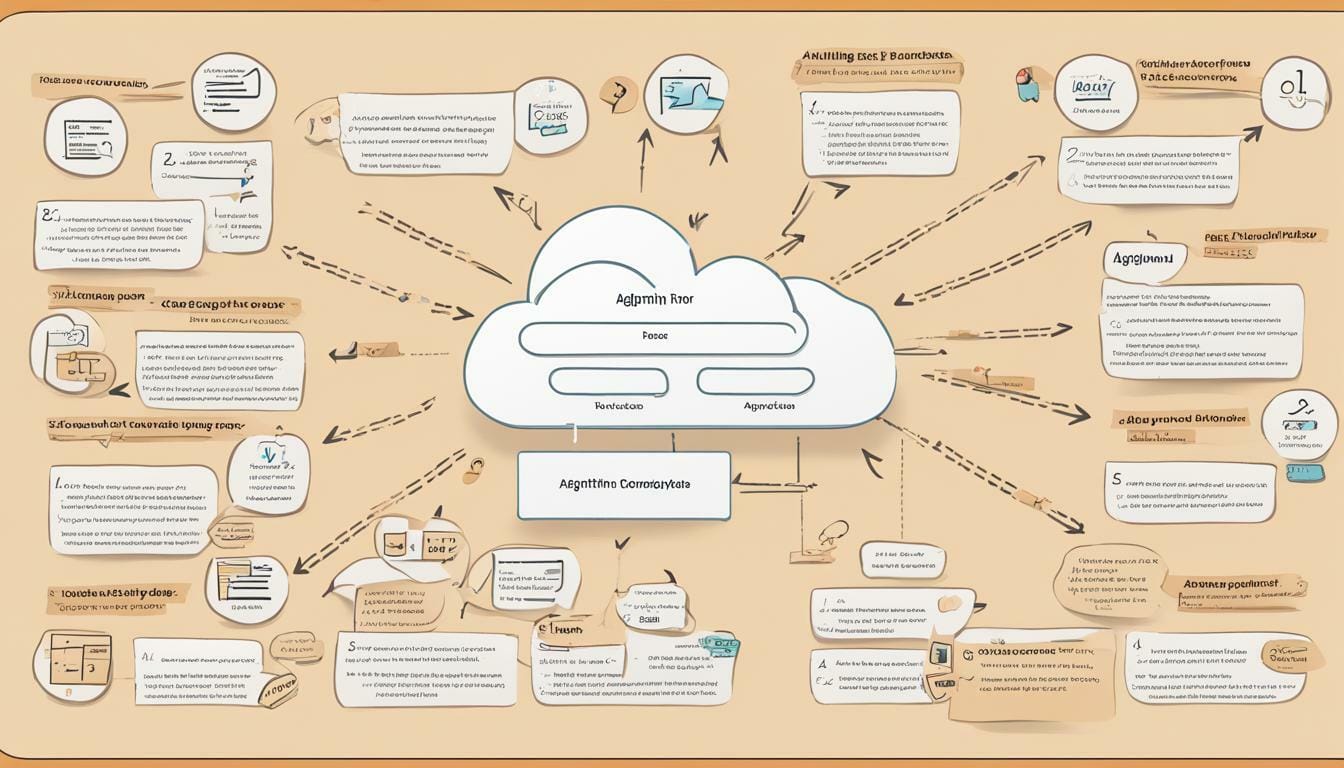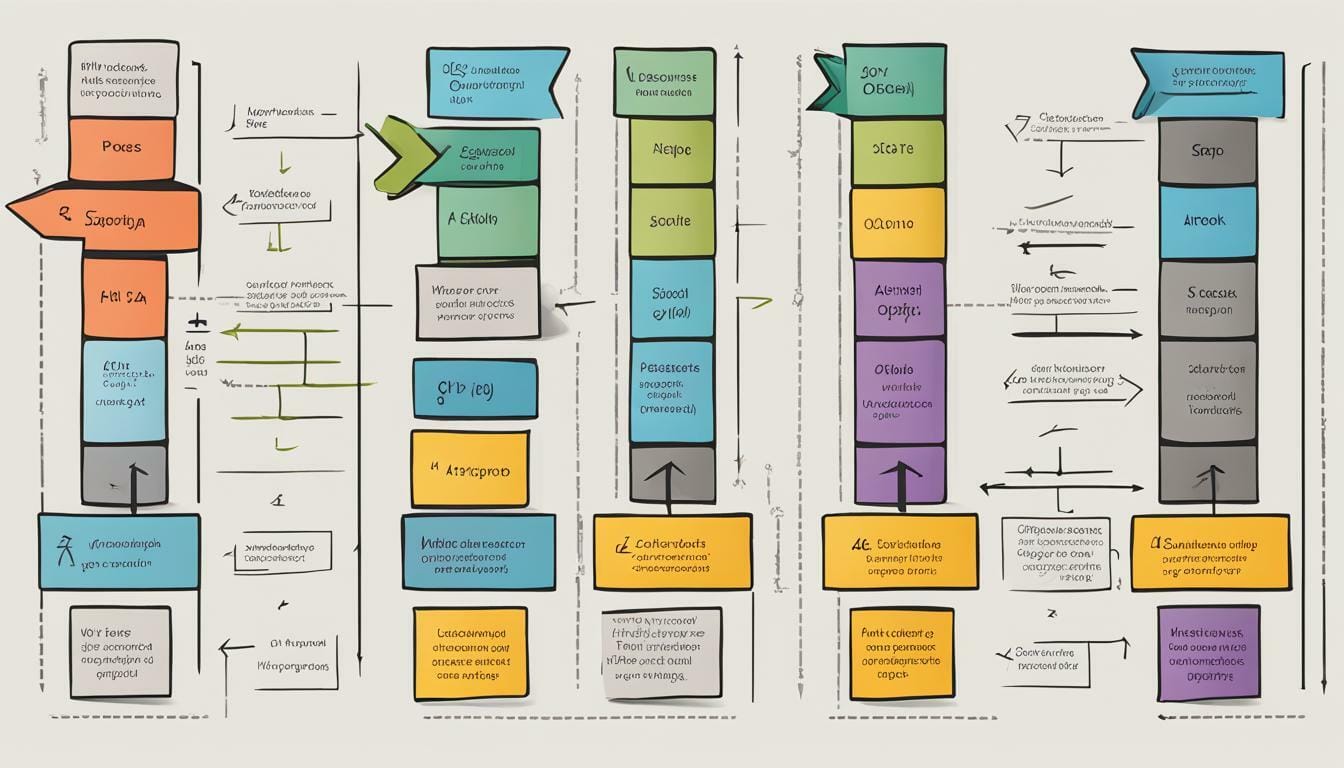Make the Leap: Simplify Your Transition to Tech Career

Do you feel an inclination towards building a career in the technology sector, but feel intimidated by the necessity for technical skills? Rest assured, this fear isn’t out of the ordinary. A plethora of beginners grapple with the intricate aspects of programming and algorithm development. Despite this, acquiring proficiency in building algorithms could transform into a pivotal element for those who aspire to advance their career in the tech sphere.
Writing algorithms for beginners may seem daunting at first, but it’s a key skill that can simplify your transition to a tech career. In this article, I’ll walk you through the basics of algorithm writing, providing a step-by-step guide that’s beginner-friendly. By the end of this article, you’ll have a solid foundation in algorithmic thinking and be ready to take on more complex projects.
Key Takeaways:
- Writing algorithms is an essential skill for anyone pursuing a tech career.
- Beginners can start with easy algorithms and gradually progress to more complex ones.
- Algorithmic thinking can enhance problem-solving skills and improve overall programming abilities.
- Resources such as online tutorials and coding platforms can help beginners continue their learning journey.
Understanding the Basics of Algorithm Writing
If you’re new to algorithm writing, it’s essential to start by understanding the basics. Simply put, an algorithm is a set of instructions that a computer can follow to solve a problem or perform a task. These instructions are written in a specific programming language so that machines can interpret them and carry out the desired action.
Knowing how to write algorithms is crucial in the tech industry, as it allows developers to create efficient and effective software. By breaking down complex tasks into a series of smaller, manageable steps, algorithms help to streamline processes and reduce errors.
As a beginner, it’s important to focus on beginner-friendly algorithm writing techniques. This means starting with simple algorithms and gradually building up to more complex ones as your skills develop. By doing so, you’ll gain a solid understanding of the basics of algorithmic thinking and be ready to tackle more complex challenges.
Some of the key concepts you’ll need to understand when writing algorithms include variables, loops, and conditional statements. Variables are used to store data, while loops and conditional statements allow you to repeat instructions or make decisions based on specific conditions.
Remember that algorithm writing isn’t just about creating functional code. It’s also about creating code that is easy to read, understand, and modify. By prioritizing code clarity and simplicity, you’ll make it easier for others to work with and build upon your code.

Algorithm Writing Basics
Here are some key concepts that every beginner should know when getting started with algorithm writing:
- Variables: Used to store data that can be manipulated by the algorithm.
- Loops: Used to repeat a set of instructions a certain number of times or until a specific condition is met.
- Conditional Statements: Used to make decisions based on specific conditions.
When writing algorithms, it’s essential to follow best practices for code readability and simplicity. Using descriptive variable names, commenting your code, and breaking down complex tasks into smaller, more manageable steps are all effective strategies for creating clear and concise code.
“Good code is its own best documentation.”
By prioritizing code readability and simplicity, you’ll be able to write efficient, effective algorithms that are easy to understand and modify.
Step-by-Step Guide to Algorithm Writing
Now that you understand the basics of algorithm writing, let’s dive into a step-by-step guide for beginners. It’s important to note that as you gain experience, your approach to writing algorithms may change and become more sophisticated.
1. Define the problem: The first step is to clearly define the problem that needs to be solved. Break down the problem into smaller, more manageable parts.
2. Develop a plan: Once you have a clear understanding of the problem, develop a plan for solving it. This plan should include a series of steps or actions that will accomplish the end goal.
3. Write the code: With a plan in place, it’s time to start writing the code. Write each step of the plan in code, testing and refining as you go along.
4. Debugging: Once you’ve written the code, test it thoroughly to ensure that it works as expected. Debug any errors that you encounter along the way.
Remember, writing algorithms is all about problem-solving. Keep in mind that there are many ways to approach a problem, and don’t be afraid to experiment and try out different solutions.

“Algorithmic thinking is a way of getting to the bottom of a problem and understanding it in a way that leads to the creation of a new and better solution.”
Finally, don’t get discouraged if you encounter difficulties along the way. With practice, patience, and persistence, you can become proficient in algorithm writing. And remember, the more you practice, the more confident you’ll become!
Understanding Complex Algorithms
Now that you have a basic understanding of algorithm writing, it’s time to explore more complex algorithms. These algorithms are used in real-world scenarios and require a deeper understanding of algorithmic thinking.
There are many types of algorithms, each with their own unique applications. For example, sorting algorithms are used to organize data, while search algorithms are used to find specific information within a dataset. Other types of algorithms include recursive algorithms, greedy algorithms, and dynamic programming algorithms.
It’s important to note that complex algorithms can be challenging to write, even for experienced programmers. However, by mastering the fundamentals of algorithm writing and practicing consistently, beginners can gradually build their skills and tackle more complex problems.
One key aspect of writing complex algorithms is optimizing their efficiency. This involves reducing the amount of time and resources required to execute the algorithm. As datasets become larger and more complex, optimization becomes increasingly important to ensure the algorithm can function effectively.
Additionally, understanding the limitations of algorithms is crucial when writing complex ones. It’s important to recognize that there may not always be an algorithmic solution to a problem, and other methods may need to be employed.
Overall, complex algorithm writing requires a strong foundation in the basics and a willingness to learn and experiment. With practice and persistence, beginners can develop their skills and contribute to the development of innovative tech solutions.

Practical Tips for Effective Algorithm Writing
As a beginner, learning algorithm writing may seem daunting at first. However, with the right strategies and techniques, you can improve your algorithm writing skills and write efficient and effective algorithms. In this section, I will share some practical tips and tricks to help you master algorithm writing.
Tip 1: Start with Simple Problems
When starting to write algorithms, it’s best to begin with simple problems. For instance, you can try solving a problem that requires finding the largest number in an array or sorting a list in ascending order. Starting with simple problems allows you to build a strong foundation and gain confidence in your ability to write algorithms.
Tip 2: Keep Your Code Readable
Writing understandable code is crucial in algorithm writing. You should aim to write code that is easy to follow and understand. Your code should also be properly commented to explain what each section of the code does. This will help you find errors and debug your code more quickly and easily.
Tip 3: Use Problem-Solving Techniques
Algorithm writing requires problem-solving skills. To improve your problem-solving abilities, you need to practice regularly. You can try solving puzzles, participate in coding challenges, or work on small coding projects to enhance your problem-solving skills. By using problem-solving techniques, you can apply your problem-solving skills to algorithm writing.
Tip 4: Optimize Your Code
When writing algorithms, it’s essential to optimize your code. Optimization can help reduce the time it takes for your algorithm to complete. Review your code and try to eliminate any unnecessary lines of code. You can also consider using data structures such as arrays or linked lists to optimize your code.
Tip 5: Practice, Practice, Practice
Practice makes perfect when it comes to algorithm writing. Try writing algorithms for different problems or variations of the same problem. Practicing will help you recognize patterns and develop a better understanding of algorithm writing.
By following these practical tips, you can improve your algorithm writing skills and become a better algorithm writer. Remember, algorithm writing takes time and practice, so don’t be discouraged if you don’t get it right the first time.

Common Challenges in Algorithm Writing
Algorithm writing can be a challenging task, even for seasoned programmers. However, beginners may encounter certain common difficulties that can hinder their progress. In this section, we will explore some of these challenges and provide strategies to overcome them.
Premature Optimization
One of the most common mistakes that beginners make is premature optimization. This occurs when programmers focus on optimizing their code before they have a functional algorithm. It is important to remember that optimization should come after the algorithm is written and tested. Otherwise, you risk wasting time and effort trying to optimize code that may ultimately need to be rewritten or discarded.
Overcomplication
Another common challenge in algorithm writing is overcomplication. Beginners may try to solve a problem with a complex algorithm when a simpler solution exists. It is important to keep your algorithms concise and straightforward, focusing on solving the problem at hand without unnecessary complexity.
Debugging
Debugging can be a frustrating and time-consuming process, especially for beginners. However, it is an essential part of algorithm writing. To make the debugging process easier, it is important to write code that is easy to read and understand. Use comments and descriptive variable names to make your code more readable, and break your algorithm down into smaller, testable components.
Testing
Testing is another important aspect of algorithm writing. Beginners may struggle with testing their algorithms, especially if they are not familiar with testing frameworks or best practices. However, testing is critical to ensuring that your algorithm works as intended and is free of bugs and errors. Consider learning a testing framework or using a simple manual testing process to confirm that your algorithm functions as expected.
By being aware of these common challenges and implementing strategies to overcome them, beginners can enhance their algorithm writing skills and become more effective programmers.

Resources for Further Learning
If you’re eager to expand your knowledge and skills in algorithm writing, there are many valuable resources available online. Here are some of my top recommendations:
Algorithm Writing Tutorial
The Algorithm Design Manual by Steven Skiena is an excellent resource for beginners. This book covers everything from basic algorithms to advanced data structures and graph algorithms. The author provides clear explanations and practical examples that make it easy to understand even complex concepts. You can also find numerous algorithm writing tutorials on YouTube that are helpful for beginners.
Beginner’s Guide to Algorithm Writing
Codecademy is a great platform for beginners who want to learn algorithm writing. Their online courses are designed for all skill levels, and they offer a beginner-friendly guide to algorithm writing that covers the basics. The guide includes step-by-step instructions and practice exercises to help you improve your skills.
Learn Algorithm Writing for Beginners
For those who prefer a more interactive approach to learning, check out HackerRank. This website offers a range of programming challenges and algorithms to help you practice your skills. They also have a dedicated section for beginners that provides clear explanations and examples. Additionally, CodeFights is another online platform that offers algorithm writing challenges and tutorials for beginners.
By utilizing these resources, you can enhance your algorithm writing skills and prepare yourself for a successful career in tech.

Can a Data Analyst Career Help Simplify Transitioning to a Tech Career?
Transitioning to a tech career can be simplified by leveraging data analyst career opportunities. Data analysts possess valuable skills that are highly sought after in the tech industry. Their expertise in handling and analyzing data, along with their problem-solving abilities, make them well-suited for various tech roles. Acquiring a foundation in data analysis can pave the way for a successful career transition into the tech field.
Case Studies: Applying Algorithms in Real-World Projects
Algorithm writing basics are essential in creating solutions that solve real-world problems. Here are some case studies that showcase the value of algorithm writing in various industries:
Case Study 1: Healthcare
In healthcare, algorithms are used to analyze medical data to develop diagnoses and treatment plans. For example, machine learning algorithms can help identify patients who are at risk of developing chronic diseases such as diabetes. Through predictive analysis, doctors can provide early interventions that significantly improve patient outcomes. Using algorithm writing, healthcare professionals can improve patient care and create personalized treatment plans.

Case Study 2: Finance
Algorithm writing is also crucial in finance, where algorithms are used to track and analyze market trends, identify trading opportunities, and manage risk. For example, investment banks use algorithms to automate trading strategies and optimize investment portfolios. By writing algorithms, financial professionals can gain a competitive edge in the market and make informed decisions based on data-driven insights.
Case Study 3: Transportation
In the transportation industry, algorithms are used to optimize routes for delivery trucks, ride-sharing services, and public transportation. For example, algorithms can help ride-sharing services match drivers with riders efficiently, reducing wait times for users and maximizing revenue for drivers. Additionally, algorithms can help public transportation systems improve their schedules, ensuring that buses and trains arrive on time and minimizing delays. With algorithm writing, transportation professionals can create efficient and effective systems that improve user experience.
These case studies are just a few examples of the many applications of algorithm writing in real-world scenarios. By understanding algorithm writing basics and applying them creatively, professionals can create innovative solutions that have a significant impact on various industries.
How Can Improving Technical Writing Skills Help in Transitioning to a Tech Career?
Improving technical writing skills can greatly enhance technical writing skills in transitioning to a tech career. Clear and concise communication is crucial in the tech field, and strong technical writing can demonstrate expertise and help convey complex ideas to both technical and non-technical audiences.
Conclusion
Writing algorithms for beginners can be a daunting task, but with the right guidance and resources, anyone can learn this valuable skill. By understanding the basics of algorithm writing, following a step-by-step guide, and practicing effective strategies, beginners can build a solid foundation and improve their algorithm writing skills.
In today’s tech-driven world, algorithm writing is in high demand, and having this skill can open up exciting career opportunities. I encourage readers to continue their learning journey and explore the many possibilities that algorithm writing offers.
Remember, there are many resources available for beginners, including online tutorials, books, and coding platforms. These resources can help you enhance your skills and stay up-to-date in this rapidly evolving field.
Stay Ahead of the Curve
As the demand for algorithm writing continues to grow, it’s important to stay ahead of the curve and be well-versed in this skill. By investing time and effort in learning algorithm writing, beginners can position themselves for success in the tech industry and beyond.
FAQ
Q: What is algorithm writing?
A: Algorithm writing is the process of creating a step-by-step set of instructions or rules that solve a specific problem or perform a specific task within a computer program. It involves breaking down complex problems into smaller, more manageable steps that a computer can execute.
Q: Why is algorithm writing important for beginners?
A: Algorithm writing is important for beginners because it forms the foundation of programming and problem-solving in the tech industry. It helps beginners develop logical thinking skills, understand how different components of a program interact with each other, and write more efficient and effective code.
Q: How can beginners start writing algorithms?
A: Beginners can start writing algorithms by following a step-by-step guide. They can break down the problem they want to solve into smaller steps, define the inputs and outputs, and gradually refine their solution. It’s important to practice and learn from examples to improve algorithm writing skills.
Q: Are there any resources available for beginners to learn algorithm writing?
A: Yes, there are various online tutorials, books, and coding platforms available for beginners to learn and practice algorithm writing. These resources provide step-by-step tutorials, exercises, and real-world examples to help beginners enhance their skills and gain more confidence in writing algorithms.
Q: What are some common challenges in algorithm writing?
A: Some common challenges in algorithm writing include understanding the problem requirements, optimizing the algorithm for efficiency, and debugging errors. Beginners may also face difficulties in translating their ideas into a structured algorithm. However, with practice and perseverance, these challenges can be overcome.
Q: How can beginners improve their algorithm writing skills?
A: Beginners can improve their algorithm writing skills by focusing on code readability, practicing problem-solving techniques, and studying various algorithmic concepts. They can also seek feedback from experienced programmers, participate in coding challenges, and analyze and learn from existing algorithms in open-source projects.





